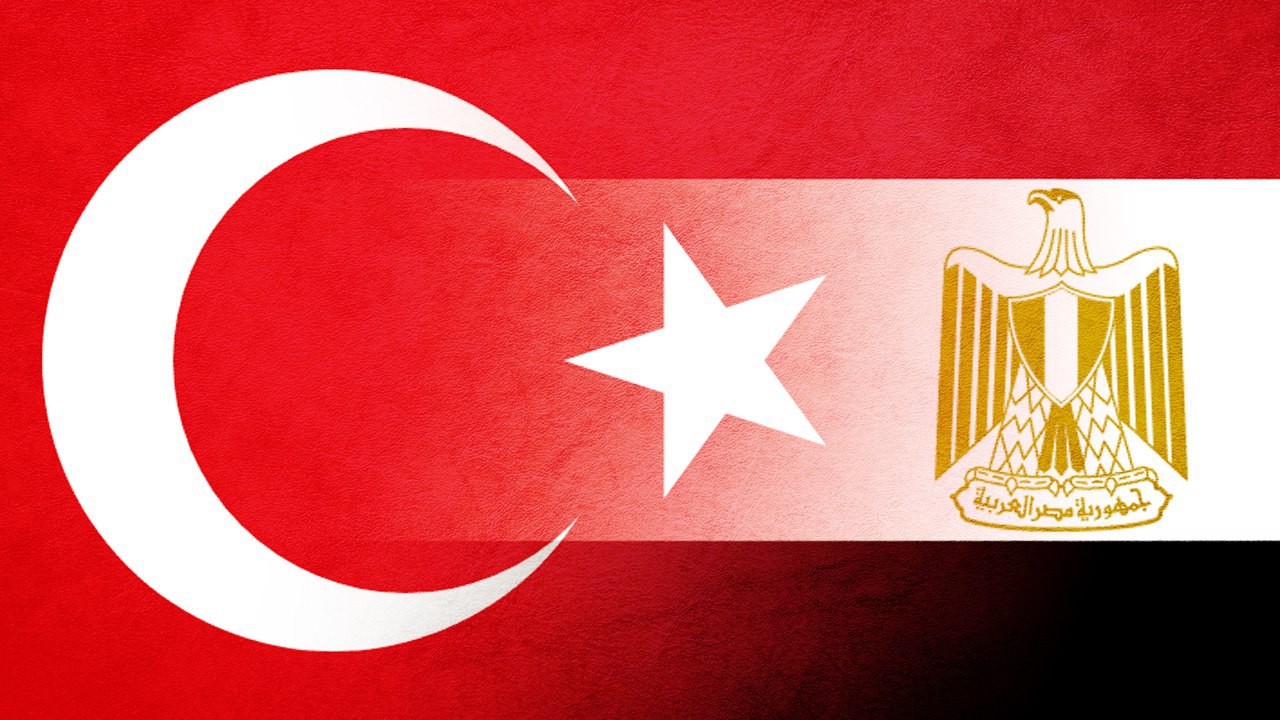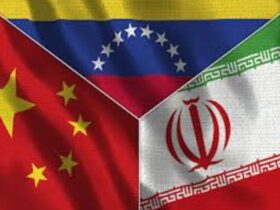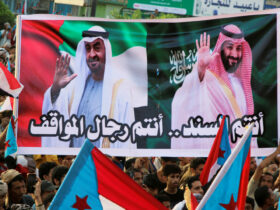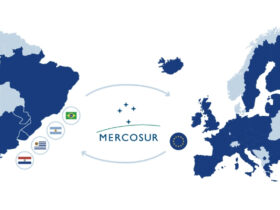Security cooperation, a settlement in Libya, and gas cooperation.
Security cooperation, a settlement in Libya, and gas cooperation.
By Mohamed Sabreen, from Cairo / Egypt
Sometimes crises intertwine and interests intersect, providing the Middle East with a “window of opportunity” to move forward. This was achieved during the unique partnership between King Faisal and President Sadat. The Cairo-Riyadh understanding contributed to the unification of the Arab states, which led to the great October War of 1973. At the current moment, complex crises provide a “rare opportunity” for Egypt and Türkiye
to elevate their partnership. Based on the available opportunities on the ground, Cairo and Ankara could accelerate the completion of a shortlist that includes a settlement in Libya, security cooperation with the Gulf, and economic integration, including gas and energy.
There is no doubt that the Egyptian-Turkish partnership will bring about fundamental changes and shifts in the strategic equations in the Middle East and Eastern Mediterranean. The two civilizational powers await a major role in preserving the security and stability of the Arab and Islamic nations, and they currently have four urgent issues at their disposal: Gaza, the Palestinian state, Syria, Sudan, and Libya.
I believe that Cairo and Ankara hold many cards, and with more coordination, relief from the heavy baggage of the past, and a strong build-up of growing trust, we will witness “major breakthroughs” on important issues.
At that moment, Israel’s fears will deepen enough to deter it from its arrogance and brutality. Most likely, we are witnessing the beginning of a partnership between Cairo and Ankara, and others must prepare for the return of two powers with whom history has often paused in its journey through time.
Strategic Cooperation Council
The joint Turkish-Egyptian planning group held its first meeting in Ankara on Wednesday, November 12, chaired by the two countries’ foreign ministers, Hakan Fidan and Badr Abdel-Aty. They discussed preparations for the second meeting of the high-level Strategic Cooperation Council, scheduled to be held in Cairo and co-chaired by President Sisi and President Erdoğan.
The meeting addressed various aspects of Egyptian-Turkish relations, as well as regional and international issues, primarily the situation in Gaza, the implementation of US President Donald Trump’s peace plan, and the situations in Syria, Sudan, and Libya.
Centenary of Established Relations
Abdel-Aty and Fidan emphasized the symbolic significance of this year, which marks the centenary of the establishment of diplomatic relations between the two countries, reflecting the depth of the historical and cultural ties that bind the two friendly nations. Minister Abdel-Aty presented the Turkish side with a museum-size replica of the statue of Amenhotep III, commemorating the centenary of diplomatic relations between Egypt and Türkiye. This gesture reflects the deep historical and cultural ties that bind the two countries and their friendly peoples. The replica will be displayed in a prominent square or location in the Turkish capital, Ankara, to mark the occasion.
Trade volume reaches $15 billion
During the meeting, both ministers emphasized the commitment of their respective leaderships to strengthening bilateral cooperation across all sectors and building upon the momentum achieved over the past two years. Minister Abdel-Aty noted that the reciprocal visits of President Recep Tayyip Erdoğan to Cairo in February 2024 and President Abdel Fattah al-Sisi to Ankara in September of the same year laid the foundation for a new phase in cooperation between the two countries following the reactivation of the High-Level Strategic Cooperation Council.
The official spokesperson added that Minister Abdel-Aty commended the convening of the first meeting of the joint planning group between the two countries, hosted by Ankara and chaired by the two countries’ foreign ministers during the current visit. This meeting was held in preparation for the Turkish President’s visit to Cairo in 2026 and the planned Business Forum on the sidelines of that visit. The meeting also addressed ways to bolster bilateral cooperation in various economic and investment sectors. Minister Abdel-Aty emphasized Egypt’s aspiration to increase trade volume to $15 billion within the next five years and to enhance direct Turkish investments in the industry, energy, transportation, tourism, and technology sectors. The two sides also discussed cooperation in the areas of green transition, carbon emission reduction, and new and renewable energy, as well as opportunities for collaboration in rare earth mineral exploration.
Palestine, Sudan, Syria, and Libya
Regarding regional issues, the two ministers discussed developments in the Gaza Strip and stressed the importance of upholding the Sharm El-Sheikh Peace Agreement and the necessity of moving to the second phase of the US President’s plan. The two sides also discussed preparations for the Cairo International Conference on Reconstruction and Early Recovery in the Gaza Strip. Minister Abdel-Aty expressed Egypt’s hope for active Turkish participation in the conference, which would contribute to mobilizing international efforts to support the reconstruction of the Strip.
The two ministers also affirmed their commitment to the two-state solution based on the June 4, 1967 borders, with East Jerusalem as its capital, and rejected any attempts to alter the legal status or impose new realities on the ground.
The talks addressed developments in Sudan, with Minister Abdel-Aty emphasizing Egypt’s unwavering support for the unity and stability of Sudan and its national institutions. He condemned the horrific atrocities witnessed in El Fasher, stressing the importance of reaching a comprehensive ceasefire and opening humanitarian corridors to ensure the flow of aid throughout the country. Both sides agreed on the importance of concerted regional and international efforts to encourage political solutions and national dialogue.
Regarding the Libyan crisis, Minister Abdel-Aty reiterated Egypt’s support for the roadmap proposed by the UN mission and called for holding simultaneous presidential and parliamentary elections as soon as possible. He also called for the withdrawal of all foreign forces, foreign fighters, and mercenaries from Libyan territory, thereby restoring security and stability and preserving Libya’s unity and sovereignty.
The talks also addressed developments in Syria, with Minister Abdel-Aty emphasizing Egypt’s firm position calling for respect for the unity and sovereignty of Syrian territory and rejecting any actions or interventions that could undermine the country’s stability. He called for the activation of a comprehensive political process that fulfills the aspirations of the Syrian people. Regarding the African continent, the two ministers emphasized the importance of strengthening Egyptian-Turkish cooperation in Africa, contributing to development and stability on the continent. They agreed to enhance the trilateral Egyptian-Turkish-African partnership through joint development and investment projects, particularly in the areas of infrastructure, energy, and agriculture. Minister Abdel-Aty also stressed the importance of supporting stability in the Horn of Africa, respecting the sovereignty and territorial integrity of Somalia, and rejecting any attempts to interfere in its internal affairs.
Coordination on Palestine
Cairo and Ankara have come a long way to reach this stage of coordination, as is clearly demonstrated by the aggression on Gaza and their refusal to liquidate the Palestinian cause. What is astonishing is how the institutions of the Egyptian deep state have succeeded in dealing with realism, flexibility, and “strategic patience,” despite the turmoil in the domestic and Arab arena, and the unprecedented incitement campaigns against Cairo in dealing with issues related to Egyptian and Arab national security.
At the same time, it was fascinating how the Turkish deep state was able to affect a shift in the Turkish position, leading to a firm Turkish conviction of the inevitability of “coordination and cooperation” with the Egyptian state. Instead of getting involved in a confrontation with Cairo, Erdogan and the Turkish deep state chose a “strategic partnership” with Egypt.
Turkish state institutions appreciated the Egyptian government’s decision not to conclude any agreements regarding Mediterranean gas reserves at Türkiye’s expense, despite the “enticements.” Despite the severity of the dispute with Ankara at the time, Cairo waited for Türkiye to reconsider its calculations. I believe that Egypt and Türkiye have both won, and now we are witnessing regular consultations and ongoing coordination between the two leaderships, as well as joint military maneuvers and manufacturing.
As usual, Cairo does not like to make a fuss about matters related to its national security and does not make a statement if a hint would suffice. It doesn’t need to rush toward the superpower that holds the international order tightly, nor does it provoke problems with the master of the White House. Rather, it manages its affairs diplomatically and shrewdly, foils unbridled projects, rejects the liquidation of the Palestinian cause, and knows it stands on the right side of history. Cairo and Ankara have managed to coordinate positions and jointly pressure President Trump, whether on the impossibility of displacement, the rejection of the annexation of the West Bank to Israel, or the necessity of halting the war in Gaza.
Joint Maneuvers After 13 Years
Many capitals of major powers and important circles on both shores of the Mediterranean have paused as Egypt and Türkiye
conduct military maneuvers for the first time in 13 years. Perhaps the secret to the extraordinary interest lies in the great momentum generated by the strategic partnership between Egypt and Türkiye. The continued cooperation between Cairo and Ankara at this pace is likely to create “new balances” in the strategic equations in the Middle East and the Eastern Mediterranean. Strangely, Israel was among the first to pause the Egyptian-Turkish military maneuvers. Israeli media highlighted the joint naval maneuver between Egypt and Türkiye, dubbed “Sea of Friendship,” which began last Monday and will continue until September 26 in the Eastern Mediterranean. The Israeli channel “i24NEWS” reported that these maneuvers come after a 13-year hiatus, citing a statement by Turkish Defense Ministry spokesman Zeki Aktürk, who recently announced the resumption of joint naval military exercises between the two countries.
The Turkish general explained that the maneuvers, which will be held from September 22 to 26, are the first of their kind since 2013. They aim to develop bilateral relations and enhance the capabilities of joint operational cooperation between the Turkish and Egyptian navies.
Zeki Aktürk noted that the “Distinguished Observers Day,” scheduled for September 25, will be attended by the commanders of the two navies, a symbolic step reflecting the advanced level of military coordination between them.
The Turkish Ministry of Defense revealed that the Egyptian ships “Tahya Misr” and “Fouad Zekri” will visit the Turkish port of Aksaz as part of the maneuvers. The Turkish side will also include the frigates “TGG Oruc Reis” and “TGG Gediz,” the assault boats “TGG Impat” and “TGG Bora,” the submarine “TGG Gur,” and two F-16 fighter jets, along with units from the Egyptian Navy. It’s worth noting that the “Sea of Friendship” maneuvers first began in 2009 in the Mediterranean and continued annually until 2013, before being suspended due to tense political relations between Cairo and Ankara.
Their resumption is seen as an indication of a tangible improvement in bilateral relations and a shared desire to strengthen security and defense cooperation in the Eastern Mediterranean region.
Tensions Rise in Israel
It appears that the rapprochement between Cairo and Ankara has raised Israeli concerns. An Israeli analyst warned of what he described as Egypt’s moves “on both sides, with Türkiye and Hamas,” while simultaneously playing the role of mediator to resolve the war in Gaza.
Israeli analyst Mordechai Kedar, an Israeli researcher of Arab culture, commented on Egypt’s role in the region and its announcement of military exercises with Türkiye, saying, “Egypt must decide its position: is it with Israel or with Hamas?”
Kedar brazenly stated, “We expect Egypt to be either with us or against us. It cannot sit on the fence, one foot here and one foot there, supporting Hamas on one side and assisting Israel in negotiations to release the kidnapped soldiers on the other.”
Kedar added, “Yes, Egypt is playing the role of mediator, but at the same time, there are accusations of continued smuggling of weapons and vehicles from Egyptian territory into Gaza. You can’t hold the stick at both ends, and Egypt must make a clear decision: Is it with Hamas terrorism or with Israeli peace? My discussion here is general, not limited to what relates to the war.”
It is clear that Israel is seething, and the Israeli elite is deeply angry about the coordination between Egypt and Türkiye, and Cairo’s ability to manage a highly complex battle with unparalleled calm and cool nerves, whether in refusing the displacement, thwarting Trump and Netanyahu’s plan to swallow up Gaza, or contributing significantly to convincing influential capitals and figures like French President Emmanuel Macron that this is the moment for “historic recognition” of the State of Palestine. Macron’s visit, accompanied by President Sisi, to the wounded Palestinians in Arish had a profound impact, prompting France to lead the international effort to establish an independent Palestinian state. Cairo threw its weight behind an international campaign condemning the genocide perpetrated by the occupying state, working in concert with Arab and Islamic countries and Cairo’s friends to isolate Israel. Erdogan, through his ties to Trump, is also playing a major role in favor of the Palestinian and Arab causes.
6+2: The Most Likely Scenario
On the other hand, the first Israeli attack on a Gulf state, Qatar, has triggered changes in Arab defense policies, with growing calls for regional cooperation and the conclusion of joint defense agreements. Some politicians have even called for the establishment of an “Islamic NATO.” Israel, Saudi Arabia, and Pakistan have agreed to a joint defense agreement, and Kuwait and Türkiye have entered into advanced negotiations on a joint defense agreement. This comes amid speculation that the most likely formula is bilateral agreements. After a considerable period of laying the groundwork, the door will be open for a 6+2 formula for security cooperation. Informed sources suggest the possibility of forming a military cooperation mechanism between the six Gulf Cooperation Council states, Egypt, Türkiye, and perhaps Pakistan and other countries later. This presents an opportunity for Türkiye and Egypt to strengthen their strategic partnership in the field of security and defense.
An “Unreliable” Ally
Undoubtedly, Washington’s lackluster response to the Israeli aggression against Doha has placed it in the category of an “unreliable ally,” even though the United States, which has the largest regional base in Doha, had recently granted Qatar the status of a “major non-NATO ally.” However, this apparently did not prevent Israel from carrying out its first attack on a Gulf state. Moreover, the United States was likely aware of this move.
Kristin Diwan, a senior fellow at the Arab Gulf States Institute in Washington (AGSIW), wrote after the attack that “the Israeli strike… shakes the Gulf states’ assumptions about their relationship with the United States and will bring them closer together.” She added, “These oil states are very similar, and this direct attack on their sovereignty and security will be disastrous for all of them.” As a result, Sanam Vakil, director of the Middle East and North Africa program at Chatham House, predicts in an article in the British newspaper The Guardian that “Gulf rulers will continue to strive for greater strategic autonomy and are increasingly determined to hedge against the risks of dependence on the United States.”
All this explains the growing talk, over the past week or so, of forming an “Islamic NATO,” a defensive alliance between Islamic and Arab states, modeled after the North Atlantic Treaty Organization (NATO).
At the emergency summit organized by the Arab League and the Organization of Islamic Cooperation last week in Doha, Egypt proposed the formation of a joint task force for Arab states, similar to NATO. Iraqi Prime Minister Mohammed Shia al-Sudani called for a collective approach to regional security.
Meanwhile, the six Gulf Cooperation Council (GCC) member states—Bahrain, Kuwait, Oman, Qatar, Saudi Arabia, and the United Arab Emirates—announced they would invoke a clause in their mutual defense pact stating that an attack on one member state is an attack on all. The wording of the clause is similar to that used in NATO’s Article 5.
Following the emergency summit, Gulf defense ministers held another meeting in Doha, agreeing to enhance the sharing of intelligence and air situation reports and accelerate the establishment of a new regional ballistic missile warning system. Plans were also announced for joint military exercises.
That same week, Saudi Arabia announced the conclusion of a “Joint Strategic Defense Agreement” with Pakistan. Both countries declared that “any aggression against either of them is considered an aggression against both.”
The Reality Is Different
It may seem as if an “Islamic NATO” is forming to confront Israel, but the reality is somewhat different. Andreas Krieg, a lecturer at the School of Security Studies at King’s College London, believes that “a NATO-style alliance is unrealistic because it would bind the Gulf states to wars they do not consider vital to their interests.” However, observers say that things are changing after the Doha attack. What the world may see instead of an “Islamic NATO” is the so-called “6+2 formula,” explains Cinzia Bianco, an expert on Gulf states at the European Council on Foreign Relations (ECFR). The term “6+2” refers to the six Gulf Cooperation Council states, Türkiye, and Egypt. Cinzia Bianco believes that “it’s not really about an Article 5-type arrangement,” as the Gulf states’ commitment to each other’s defense is not as strong as that of NATO members. It’s more likely to be about unifying security and defense positions, and more importantly, sending a deterrent message to Israel.
Andreas Krieg believes that the “6+2” formula makes more sense than an “Islamic NATO.” He believes that Türkiye is “the most credible non-Western partner for the Gulf, with its troops already stationed in Qatar since 2017 and its real ability to act quickly in crises.” He claims that “for Egypt, the issue is more complicated. While Cairo has a formidable military force, there are reservations about it in some Gulf capitals.”
Even if the “6+2” formula is on the table, it will happen slowly and quietly, as both Andreas Krieg and Cinzia Bianco assert.
Craig predicts that “most of the serious changes will take place behind the scenes. We’ll see public statements, summits, and joint exercises. But the important things, like sharing radar data, integrating early warning systems, or granting basing rights, will remain secret.”
It’s likely that the Gulf states, which have relied heavily on the United States, will seek to expand their defense relationships with other countries.
It will take time.
“Certainly, there are other actors, such as Russia and China, willing to replace the United States,” says Sinem Cengiz, a researcher at the Gulf Studies Center at Qatar University. “But it’s unlikely that any external actor will replace the United States overnight.”
Cinzia Bianco, for her part, believes that it’s impossible for the Gulf states to be “willing” to do so in any case. “The Gulf states are still dependent on American military technology. For example, after the Doha attack, Qatar sought reassurances from the United States that it remains a partner.”
Cinzia Bianco, for her part, believes it is impossible for the Gulf states to be “willing” to do so in any case. She says, “The Gulf states are still dependent on American military technology. For example, after the Doha attack, Qatar sought assurances from the United States that it remained a partner.”
Cinzia Bianco, a Gulf expert at the European Council on Foreign Relations (ECFR), points out, “An important side note here is that the United States has never publicly opposed this type of regional defense. In fact, it has always encouraged the construction of a single ballistic missile defense system for the Gulf states.”
In fact, greater military integration in the Gulf could mean a greater American presence, as American systems form the backbone of regional defense.
Andreas Krieg explains that, however, the political meaning has changed, with Washington no longer seen as the ultimate guarantor of security, but rather as a partner offering conditional support based on its interests. Gulf leaders are adapting to the idea that the United States has interests, not allies, and are seeking to build a Gulf security pole that stands midway between Iran and Israel.
A Settlement in Libya
Joint maneuvers between Egypt and Türkiye have raised hopes for cooperation to resolve the crisis in Libya. Both countries can move quickly and seize the opportunity, given the preoccupation of international powers intervening in Libyan affairs with other issues and conflicts, such as the war in Ukraine and the customs tariff war.
A joint settlement between Egypt and Türkiye in Libya could represent a significant shift in the course of the Libyan crisis. Their convergence of visions on the unity of Libyan territory and the cessation of foreign interference could open the way for formulating new security and political arrangements that support the electoral process and strengthen the role of national institutions.
Undoubtedly, cooperation between Cairo and Ankara on this issue could balance the interests of eastern and western Libya, mitigate regional polarization, and provide opportunities for coordination in reconstruction and investment in infrastructure and energy, thus enhancing stability and limiting the risk of a return to chaos.
Economic Cooperation Including Gas
Egyptian-Turkish relations have always been characterized by growing economic cooperation. Economic interests between the two countries have never ceased, and they have witnessed a remarkable growth in the volume of trade, reflecting the economy’s ability to transcend purely political considerations.
This paradox is most evident in the energy sector, where Ankara’s ambitions intersect with Cairo’s pivotal position on the gas map of the Eastern Mediterranean. While the two countries compete for regional influence and alliance positions, Turkish companies’ efforts to invest in the Egyptian market and Ankara’s interest in finding a foothold in the changing energy equation are not lost. A significant influx of additional gas has already begun, melting the remaining ice from Cairo and Ankara.
Turkish Energy and Natural Resources Minister Alparslan Bayraktar recently revealed that a floating storage unit (FSRU) for liquefied natural gas (LNG) owned by the state-owned energy company BOTAŞ has been loaned to Egypt, marking the first time such a unit from Türkiye has operated abroad on a temporary basis.
This came in a statement by Bayraktar following his meeting with Egyptian Minister of Petroleum and Mineral Resources Karim Badawi. He said that the meeting, which coincided with the centenary of diplomatic relations between Türkiye and Egypt, resulted in the signing of two major agreements to enhance cooperation in the energy sector, marking a new milestone in Türkiye’s international energy engagement.
Bayraktar emphasized that with the signing of the contract between the national company BOTAS and the Egyptian state-owned energy company EGAS, a floating natural gas storage unit (FSL) from BOTAS’s fleet will be deployed outside the country for the first time. This will enable the implementation of a flexible and efficient model that contributes to securing natural gas supplies to both Türkiye and Egypt.
Bayraktar explained that he believes these steps will open a new page in energy relations between Türkiye and Egypt, and he hopes they will benefit both countries.
Energy experts believe that the Turkish announcement carries comprehensive implications for consolidating institutional cooperation in the hydrocarbon and mining sectors between Cairo and Ankara, on the one hand, and for the deployment of a Turkish floating natural gas storage and regasification unit (FSL) on the other.
Figures announced by the Turkish side indicate that Egypt will receive a Turkish gasification vessel between June and November 2025, to provide daily supplies of natural gas amounting to 500 million cubic feet, for approximately $45 million. The Turkish vessel is the fifth gasification vessel Egypt has contracted since it resumed importing liquefied natural gas in April of last year.
The Turkish announcement indicates a complete thaw with Cairo and reflects a growing partnership. Türkiye topped the list of importers of Egyptian liquefied natural gas in 2023, importing 933,000 tons. However, the situation changed, specifically in September 2024, when a high-level strategic cooperation agreement and 17 memoranda of understanding were signed. Less than two months later, the Turkish company Erciyes announced its intention to establish a factory in Egypt to produce oil and natural gas pipelines, with investments of $60 million.
On the other hand, the cooperation between Cairo and Ankara reveals mutual motives. Türkiye seeks to enhance its regional influence in the energy sector through international partnerships and exploration agreements with regional countries such as Libya, Iraq, Azerbaijan, and now Egypt. This is aimed at achieving independence and strengthening its external presence despite the geopolitical challenges facing the world.
Egypt, on the other hand, aims to conclude external agreements to secure its needs and reduce its growing dependence on imports, due to declining production and a widening supply gap that reached 200,000 barrels per day in 2024.
Mediterranean Gas: A Major Opportunity
Egypt can assist Türkiye in the Eastern Mediterranean gas issue in several ways, especially given the recent improvement in political relations between the two countries. This assistance could be direct or indirect, and could take several paths, including helping Türkiye open border negotiation channels, supporting its integration into regional energy arrangements, providing its gas liquefaction infrastructure, and mediating with its adversaries in the Mediterranean.
Here, several steps can be envisioned, the most important of which are:
First: Coordination on the demarcation of maritime borders. Egypt has not yet signed a comprehensive maritime border demarcation agreement with Türkiye, but has signed with Greece and Cyprus. Egypt could open bilateral negotiations with Ankara on exclusive economic zones, which could give Türkiye greater legitimacy in its confrontation with Greece and the European Union.
Second: Cooperation in the East Mediterranean Gas Forum. The forum is based in Cairo and includes Egypt, Greece, Cyprus, Israel, Italy, Jordan, France, and Palestine, with Türkiye absent. Undoubtedly, Türkiye’s inclusion, or even informal coordination with it through Egypt, could reduce its isolation and allow it a greater role in the regional energy system. Third: Sharing Egypt’s gas transportation infrastructure. Egypt possesses massive liquefaction terminals in Idku and Damietta, which Türkiye could utilize to liquefy Turkish gas, or potentially gas from Northern Cyprus, if a political settlement is reached in the Cyprus crisis. Cooperation in this area will undoubtedly open up a gateway for Türkiye to European markets via Egypt.
Fourth: Egypt’s role as a political mediator. Egypt can play the role of mediator between Türkiye on the one hand, and Greece, Cyprus, and Israel on the other, to mitigate disputes over maritime borders and gas rights. This role enhances Cairo’s regional standing and reduces the chances of military confrontation in the Mediterranean.
Fifth: Coordination in energy markets. Through bilateral agreements, Egypt and Türkiye can coordinate on pricing and export routes to secure better market shares in Europe, especially given Europe’s need for alternatives to Russian gas.
A Promising Future and Tremendous Opportunities
The future remains promising, and tremendous opportunities await Egypt and Türkiye, given their inherent strength. Egypt has a population of 110 million, while Türkiye has 90 million, representing nearly half of the population of the Middle East. Their armed forces are also the strongest in the region. Clearly, the opportunities for cooperation between the two countries, both regionally and bilaterally, far outweigh the areas of potential competition or conflict. Joint military exercises, political coordination, and summits between the two countries’ leaders offer hope for a new phase of close relations between the two countries, built on shared interests while avoiding the mistakes of the past. Türkiye and Egypt can work together to support ongoing efforts to end the war in Gaza, deescalate regional tensions, resume Israeli-Palestinian peace negotiations, resolve the Libyan crisis, preserve the unity and stability of Syria, restore stability in Sudan, enhance cooperation in renewable energy and gas, and integrate Türkiye into gas cooperation arrangements in the Eastern Mediterranean region.
















Leave a Reply